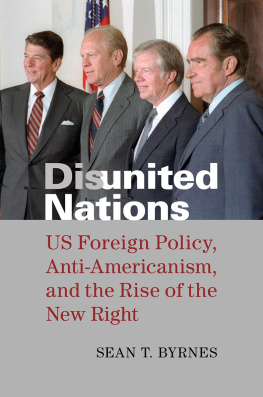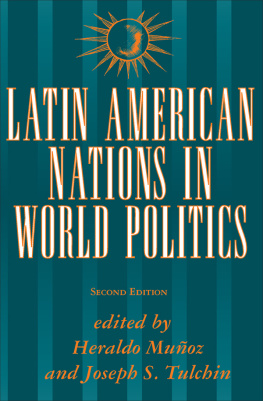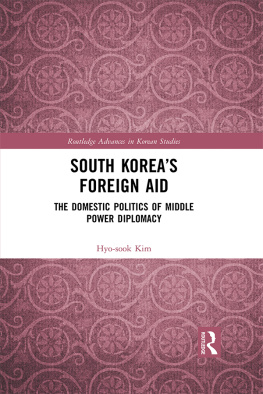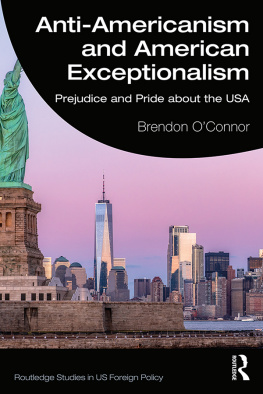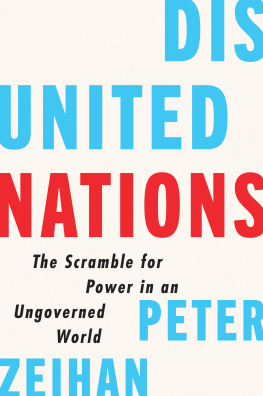Published by Louisiana State University Press
www.lsupress.org
Copyright 2021 by Louisiana State University Press
All rights reserved. Except in the case of brief quotations used in articles or reviews, no part of this publication may be reproduced or transmitted in any format or by any means without written permission of Louisiana State University Press.
Designer: Laura Roubique Gleason
Typeface: MillerText
Jacket photograph: Presidents Reagan, Ford, Carter, and Nixon pose for a portrait prior to leaving for Egypt and president Anwar Sadats funeral on October 8, 1981. Courtesy the Ronald Reagan Presidential Library.
Library of Congress Cataloging-in-Publication Data
Names: Byrnes, Sean T., author.
Title: Disunited nations : US foreign policy, anti-Americanism, and the rise of the new right / Sean T. Byrnes.
Description: Baton Rouge : Louisiana State University Press, 2021. | Includes bibliographical references and index.
Identifiers: LCCN 2020055136 (print) | LCCN 2020055137 (ebook) | ISBN 978-0-8071-7528-6 (cloth) | ISBN 978-0-8071-7587-3 (pdf) | ISBN 978-0-8071-7588-0 (epub)
Subjects: LCSH: Developing countriesForeign relationsUnited States. | United StatesForeign relationsDeveloping countries. | United NationsUnited States. | Right and left (Political science)United States. | NeoliberalismUnited States. | Anti-Americanism. | North and south. | United StatesForeign relations19451989.
Classification: LCC D888.U6 B87 2021 (print) | LCC D888.U6 (ebook) | DDC 327.73009/047dc23
LC record available at https://lccn.loc.gov/2020055136
LC ebook record available at https://lccn.loc.gov/2020055137
Acknowledgments
This book owes its existence to the time, kindness, and generosity of many.
Its origins are admittedly somewhat murky. My earliest recollection of this book is as inchoate ideas that emerged while drinking coffee one morning in a cabin near Buena Vista, Colorado, in 2011. Yet, as any good historian knows, emergence does not equate to origins, so we must go back further. In the interest of pithiness, I will avoid tracing the complete genealogy, my parentsmore on whom in a momentfilling my childhood home with books and the like, and jump ahead to somewhat more recent history.
At Fordham University I was lucky enough to have an extensive, mandatory liberal arts education (something sadly out of fashion today). It turned a young man focused on finishing school as soon as possible into a perpetual student, cementing in my mind the importance of ideas. There I met Paul Cimbala, who set me on the path to becoming a historian, and Mike Latham, whose support, guidance, and encouragement over the years has gone well beyond the call of duty for an undergraduate professor. Both are model educators and peopleI owe them a great deal.
The bulk of this study was written during my time at Emory University. There my work was facilitated by generous financial support from the university and the Emory Robert W. Woodruff Library. I was also blessed with the kindness of a community of remarkable scholars, teachers, and great human beings. I am beyond grateful to Carol Anderson for taking me under her wing and modeling to me how to be both a dedicated teacher and an innovative historian without skimping on either role. I am very much in debt to Astrid Eckert, who greatly eased the burdens that come with transitioning out of graduate-school life. I also deeply appreciate Patrick Allitts insights into this topic and his example of how to conduct the historians craft. My thanks as well to Jonathan Prude, Joseph Crespino, and the History Department staff, including Patsy Stockbridge, Becky Herring, and Katie Wilson. At the Woodruff Library, I am grateful for the work of all the staff and librarians, especially of Erin Mooney and Erica Bruchko. It would not have been possible to write chapter 6 of this book without Ericas help.
Deserving of a special note here is my advisor and friend, Dr. Fraser Harbutt. As I have said before, there was no truer example of the proverbial gentleman and scholar. He is missed. This book is also, in part, dedicated to his memory.
I am also obliged to the many friends and colleagues who have read or discussed portions of this projectat Emory and elsewhereincluding, but not limited to, Grant Autry, James Doherty, Michael Camp, Michael Kaiser, Rebecca Kumar, Ned Masek, Kara Moskowitz, Elizabeth Stice, and Charles Williams. To anyone I have forgotten, know that your contributions were more lasting than my memory, and please consider them acknowledged here.
The work similarly reflects the insights and comments of panelists and participants at the 2011 SHAFR Summer Institute, the 2012 Conference on Confronting American Power after the Vietnam War, the 2013 SHAFR Conference, and the 2015 Legal History Consortium at the Indiana University Maurer School of Law. It has been one of the great joys of my career to be able to be able to discuss history and ideas with so many talented people; thanks to you all.
The hard work, dedication, and suggestions of the staff and archivists at the Auburn Avenue Research Library, the Library of Congress, the Jimmy Carter Presidential Library, the Gerald R. Ford Presidential Library, and the Richard M. Nixon Presidential Library were also essential to this project. I could not have completed it without their help. In addition to that mentioned above, research- and travel-related funding for this research was also provided by the Gerald R. Ford Presidential Library Foundation, the Indiana University Maurer School of Law, and the Peace History Society. Thanks very much to those who donate, raise, and distribute those funds to undeserving scribblers such as myself.
Speaking of undeserving scribbling, I am grateful to LSU Press, its editors, and its staff for being willing to publish mine.
As for this projects savior, Kristi, words are insufficient. Thanks for letting me meet Liam and Molly and for being my best friend: ily/lgm. To my sister Megan, I rely on you more than you know; perhaps getting this into print will finally convince you to read it.
Lastly, to my parentsoldest friends, greatest supporters, and most honest criticsplease accept this token gesture toward an unpayable debt.
Disunited Nations

